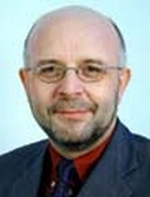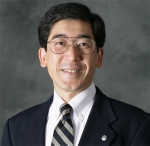Keynote Speakers
We are very pleased to have acquired the services of an excellent selection of keynote speakers for KES2008. The speakers and the titles of their talks are shown below.
Anthony Finn
DSTO, Department of Defence, Edinburgh, AustraliaLegal Issues for Military Intelligent Decision-making Technologies
More details ...
Igor S. Pandzic
University of Zagreb, CroatiaVirtual Humans: From Researcher's Fascination to Mass-market Technology
More details ...
Gloria Phillips-Wren
Loyolla College in Maryland, Baltimore, USAAssisting Human Decision Making with Intelligent Technologies
More details ...
Jürgen Schmidhuber
IDSIA, Lugano, SwitzerlandDriven by Compression Progress
More details ...
Andy Tyrrell
University of York, UKEvolvable Hardware Architectures and their role in Fault Tolerant Computational Systems
More details ...
Hideyuki Takagi
Kyushu University, JapanNew Topics from Recent Interactive Evolutionary Computation Researches
More details ...
Anthony Finn
DSTO, Department of Defence, Edinburgh, AustraliaLegal Issues for Military Intelligent Decision-making Technologies
Abstract:
Intelligent decision-making technologies (IDT) will soon have the capacity to control weapons in a manner that includes decisions regarding target identification and engagement. If permitted, this would provide these systems with the ability to decide which targets to prosecute with lethal force, without any operator intervention. This would mark a sea-change in the role of technology in warfare as the human can be removed from the decision-making loop. There are complex technological and legal issues regarding the development, deployment and exploitation of such systems. This paper outlines our obligations in respect of target discrimination under the Law of Armed Conflict (LOAC) and then uses these principles to discuss the allocation of roles and responsibilities between a human supervisor and the associated IDT.

Biography:
Dr Finn works for the Australian Department of Defence and is Head of the Defence Science & Technology (DSTO) long range research program, known as the Automation of the Battlespace Initiative (ABSI). This program focuses on the development and defence-application of autonomous and unmanned vehicle systems, and comprises a team of about fifty scientists and engineers, around half of whom are PhD-qualified. Dr Finn graduated from Cambridge University in 1989 with a PhD. Before moving to Australia to work for DSTO, he worked as a research consultant for a number of organisations in Europe, including Ferranti Defence Systems, Marconi GEC, British Aerospace, and the European Space Agency. In 2006 Dr Finn was nominated as an Adjunct Professor at the University of South Australia. He is an associate editor of two international journals and serves on the editorial review board of another. Dr Finn has published around eighty research papers and reports.
Igor S. Pandzic
University of Zagreb, CroatiaVirtual Humans: From Researcher's Fascination to Mass-market Technology
Abstract:
The talk will give a snapshot of virtual humans research and their applications. The fundamental driving force of scientific progress is the researchers' fascination and deep passion for their research topic. In few fields is this so obvious as in virtual humans: what can be more fascinating than trying to reproduce the image of ourselves - walking, talking, communicating, intelligent human-like beings. It is therefore no wonder that efforts in this direction have been going on since decades. So what do we have to show after all this work? In terms of graphics and animation, some of today's virtual characters are quite amazing. However, high levels of expressivity and naturalness require huge amounts of manual work, so fully autonomous real-time characters lag far behind such creations. When it comes to perception, most of today's virtual humans are blind (i.e. computer vision or other sensors are used only in a small number of systems), hard of hearing (i.e. speech recognition is unreliable) and the other senses are barely explored, if at all. While natural language processing, dialog systems and theory of mind have all made progress, it is fair to say that cognitive and conversational capabilities of intelligent virtual agents are nowhere near those of real people. All things considered, while huge progress has been made, there is a tremendous amount of work still in front of us on the road to truly interactive and believable virtual humans. At the same time, we have reached the stage of development where numerous applications for virtual people are springing up. In parallel with the research work, we are witnessing an increased entrepreneurial activity in this field in the recent years. Beyond movies and games, virtual humans are appearing as tutors, advisors, receptionists, personal avatars or companions in a whole array of application fields including health care, finance, retail, communications, entertainment and others.

Biography:
Igor S. Pandžic is an Associate Professor at the Department of Telecommunications, Faculty of Electrical Engineering and Computing, University of Zagreb, Croatia and director of Human-Oriented Technologies Laboratory (HOTLab). He teaches undergraduate and postgraduate courses in the fields of virtual environments and communications. His main research interests are in the field of computer graphics and virtual environments, with particular focus on character animation, embodied conversational agents, and their applications in networked and mobile environments. Igor also worked on networked collaborative virtual environments, computer generated film production and parallel computing. He published four books and around 90 papers on these topics.
Formerly he worked as a Senior Assistant at MIRALab, University of Geneva, Switzerland, where he obtained his PhD in 1998. The same year he worked as visiting scientist at AT&T Labs, USA. In 2001-2002 he was a visiting scientist in the Image Coding Group at the University of Linköping, Sweden, and in 2005 at the Department of Intelligence Science and Technology, Kyoto University, on a Fellowship awarded by Japan Society for Promotion of Science. He received his BSc degree in Electrical Engineering from the University of Zagreb in 1993, and MSc degrees from the Swiss Federal Institute of Technology (EPFL) and the University of Geneva in 1994 and 1995, respectively.
Igor was one of the key contributors to the Facial Animation specification in the MPEG-4 International Standard for which he received an ISO Certificate of Appreciation in 2000. He held various functions in organizing numerous international conferences and served as guest editor for a special topic in IEEE Communications Magazine. He has been active in international research collaborations within the EU research programmes since the 3rd Framework Programme, as well as in national research projects and collaboration with industry. Igor can be reached at igor.pandzic@fer.hr and http://hotlab.tel.fer.hr.
Gloria Phillips-Wren
Loyolla College in Maryland, Baltimore, USAAssisting Human Decision Making with Intelligent Technologies
Abstract:
The human decision making process has been characterized as relatively sequential, limited by cognitive processes, and influenced by previous experience. Under conditions associated with real-time decisions, humans can experience emotional intensity, information overload, and other stressors that often affect their choices. Decision making becomes more complex with distributed teams, collaboration across global boundaries, the speed of information refresh, and the quantity of information available through networked sources. Intelligent decision support attempts to address these issues and assist human decision making by developing systems that integrate capabilities from the human user and artificial intelligence. This talk presents research and applications of intelligent decision technologies, with a focus on intelligent agents. Future research needs to advance the field are presented.

Biography:
Gloria Phillips-Wren is associate professor in The Sellinger School of Business and Management at Loyola College in Maryland. She previously served as Chief, Propulsion Branch, for the U.S. Army Research Laboratory focusing on future weapons systems. She was awarded a Superior Civilian Service Award and served in senior decision making positions. She is Founder and Co-Editor-in-Chief with Lakhmi Jain of Intelligent Decision Technologies: An International Journal (IDT) and Chair of the KES Focus Group in Intelligent Decision Technologies. She received her PhD from the University of Maryland Baltimore County and has co-published 3 books and more than 100 research papers on real-time and intelligent decision support systems, modelling and simulation, intelligent agents in decision making, and applications of intelligent systems. She has lectured throughout the world and worked in decision support technologies with major corporations over the past 20 years.
Jürgen Schmidhuber
IDSIA, Lugano, SwitzerlandDriven by Compression Progress
Abstract:
I argue that data becomes temporarily interesting by itself to some self-improving, but computationally limited, subjective observer once he learns to predict or compress the data in a better way. Curiosity is the desire to create or discover more data that allows for compression progress. This drive motivates exploring infants, pure mathematicians, composers, artists, dancers, comedians, yourself, and recent artificial systems.

Biography
Professor Jurgen Schmidhuber was born 1963 in Munich, Germany. In 1987 he was awarded a Diploma degree in computer science and mathematics from the Technical University of Munich (TUM). In 1991 he received a PhD degree and in 1993 he achieved Habilation (the qualification for tenure professorship) both also from TUM. Since 1995 he has been Co-director of IDSIA, the Swiss AI institute in Manno (Lugano), which he helped to transform into one of the world's top AI labs. Other recent academic posts held by Jurgen Schmidhuber are, Professor of Cognitive Robotics and Computer Science at TUM since October 2004; adjunct Professor of the Faculty of Computer Science at the University of Lugano since February 2006; and Professor at SUPSI in Manno (Switzerland) since January 2003. He is the author of in excess of 100 scientific papers and has presented numerous invited talks all over the world. His main research interests include: optimal sequence learners, theoretical foundations of machine learning, optimal universal search, recurrent neural networks, generalizations and restrictions of Kolmogorov complexity, the set of all computable universes, and low-complexity art.
Andy Tyrrell
University of California, Los Angeles, USAEvolvable Hardware Architectures and their role in Fault Tolerant Computational Systems
Abstract:
Biological inspiration in the design of computing machines finds its source in essentially three biological models: phylogenesis, the history of the evolution of the species, ontogenesis, the development of an individual as directed by his genetic code, and epigenesis, the development of an individual through learning processes influenced both by their genetic code and by the environment. These three models share a common basis: a one-dimensional description of the organism, the genome. If one would like to implement some or all of these ideas in hardware can we use COTS or do we need specifically designed-for-purpose devices? This talk will consider some historical work on bio-inspired architectures before moving on to consider a new device designed and built specifically for bio-inspired work. It will consider some of the novel features present in this device, such as self-configuration and dynamic routing, which assist the implementation of ontogenetic capabilities such as development, self-repair and self-replication.

Biography
Professor Andy Tyrrell received a 1st class honours degree in 1982 and a PhD in 1985, both in Electrical and Electronic Engineering. He joined the Electronics Department at York University in April 1990, he was promoted to the Chair of Digital Electronics in 1998. Between August 1987 and August 1988 he was visiting research fellow at Ecole Polytechnic Lausanne Switzerland. His main research interests are in the design of biologically-inspired architectures, artificial immune systems, evolvable hardware, and FPGA system design,. In particular, over the last 7 years his research group at York have concentrated on bio-inspired systems. This work has included the creation of embryonic processing array, intrinsic evolvable hardware systems and the immunotronics hardware architecture. He is Head of the Intelligent Systems research group at York. He has published over 200 papers in these areas. He is a Senior member of the IEEE, and a Fellow of the IET.
Hideyuki Takagi
Kyushu University, JapanNew Topics from Recent Interactive Evolutionary Computation Researches
Abstract:
First, we review wide varieties of IEC applications. They include artistic applications such as generating computer graphics, music, and editorial design, acoustic and image signal processing, hearing aid fitting, data mining, architectural design, virtual reality, and others.
Secondly, we introduce new type of IEC applications. Major IEC applications are optimizing target systems and creating graphics, images, shapes, sounds, vibrations, and others. We introduce two new types of IEC applications. The first one is measuring human characteristics. IEC is an optimization method based on human subjective evaluation. Likely reverse engineering, we may measure the evaluation characteristics or mental conditions of an IEC user by analyzing the outputs from the target system optimized by the user. The second one is extension of IEC evaluation. Usually IEC optimizes a target system based on IEC user's subjective evaluation, i.e. psychological evaluation. We may extend the evaluation from psychological one to physiological one. We show the framework of the extended IEC.
Thirdly, we overview the researches that try to reduce IEC user fatigue and show our latest research in this area. Several approaches have been proposed to reduce IEC user's fatigue; some of them are improving input/output interface, accelerating EC search, allowing human intervention into EC search, estimating human evaluations, and others. Here, we introduce our latest research and show our view.

Biography:
Hideyuki Takagi is an Associate Professor at the Faculty of Design, Kyushu University, Japan. He received the degrees of Bachelor and Master from the Kyushu Institute of Design in 1979 and 1981 respectively, and the degree of Doctor of Engineering from Toyohashi University of Technology in 1991. While working for the Central Research Laboratories of Matsushita Electric Industrial Co. Ltd. (1981-1985), Hideyuki Takagi researched software engineering, speech recognition, neural networks, fuzzy systems, and genetic algorithms. He was a Visiting Industrial Fellow of the University of California at Berkeley, USA. (1991-1993). During this period, apart from research activities, he played an educational role through research projects and technical meetings with students. He has received wide recognition of his work and is a member of a number of academic societies, providing administrative contributions to many of them.
Prof. Takagi is interested in Computational Intelligence such as neural networks, fuzzy systems, evolutionary computations, and other so-called Soft Computing technologies, and especially cooperation of these technologies. Currently, his interest focuses on Interactive Evolutionary Computation which aims for the cooperation of human and evolutionary computation. He is also interested in signal processing and human-machine interface.




